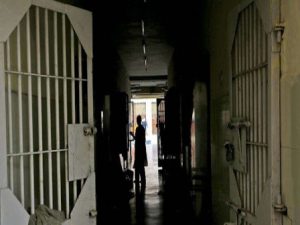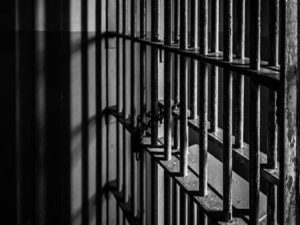Pandemic-Prison-Parole
With all violations and inhuman conditions, it is necessary to release prisoners, especially under trials, who are kept under the custody without being heard, without further causing the gross violation of the fundamental right under Article 21.

In the wake of COVID-19 pandemic, the number of infected cases has been going upwards due to the over crowdedness and inadequate medical facilities in the Indian prisons. As per the information available, almost 338 personnel are being infected till now, including inmates and staff. There is lack of trained doctors offering specialty to work in prisons as most of the sub-jails are located outside the cities, requiring visiting doctors to become a resident doctor in the prisons. Such crises lead to human rights violation of the prisoners. Many organisations and individuals are reporting the government of the real conditions in prisons. Although there have been violent attacks on the officials in Dum Dum Central Jail, Kolkata, as the inmate’s bail hearing stands due amid the coronavirus. Amnesty International revealed how during the crises, the prisoners are only given two minutes to talk, after which the call disconnects automatically, where the phone is shared by thousands of people. Moreover, some of the family members are still waiting for the call. The situation is not just frustrating, but frightening as well. Also, the condition is even dreadful in Taloja and Byculla jails where the prisoners are not provided with mask and sanitisers, instead they’re only provided with few buckets of water while sharing the space with 30 more inmates. With such unquestionably dismal jail premises, one can’t resist the opportunity to think about a large number of authorities, under trials and convicts in our correctional facilities who face the gravest danger of getting the deadly coronavirus. It would be generally uncalled for our decision-makers, who enjoy the benefit of sanitised safety in their homes and workplaces, to not to spare an idea for detainees – particularly those assumed innocent according to our lawful framework. With all violations and inhuman conditions, it is necessary to release prisoners, especially the under trials, who are kept under the custody without being heard, without further causing the gross violation of fundamental right under Article 21.
Also Read : Jails In Corona Times Conditional Parole For Prisoners
Appeal to Release Prisoners
As Dr KK Aggarwal said “sanitation facilities in prisons are horrible. Learning from other countries which are in far worse conditions, prison authorities need to make sure that inmates maintain 6-foot distance”. In March, the Supreme Court observed the human and fundamental rights of the prisoner, explicating upon Article 21. It is imperative to control COVID-19 in the prisons, and it thus directed all states and union territories to constitute a high power committee, which would determine the class of prisoners who could be released on emergency parole or temporary bail for a few weeks, so that inmates can practice social distancing.
The court observed that the situation could otherwise violate the human rights and worsen the COVID-19 situation in the country.
 However, undergoing trials in sexual assault, rape, drug cases, foreign nationals, accused of corruption, terror and anti-national activities would not be considered for interim bail. Further, the Commonwealth Human Rights Initiative assisted the Supreme Court which directed the release of convicts and under trials who are sentenced with seven years or less. Some states were of the opinion that releasing inmates will push them into the threat of COVID-19, instead, the visitors must be prohibited except in case of the emergency along with establishing separate staying areas for the new prisoners. While the convicts who do not fall under the category to be released are also barred from seeing visitors prevent the spread of disease and must only be subject to telephonic communications. The court has also directed to maintain hygiene and sanitation in the prison, along with ensuring nutritional food to increase their immunity. While these measures may help the issue of congestion in our correctional facilities to a degree, the court’s proposed arrangement despite everything disregards those prisoners who face the most noteworthy hazard from COVID-19. This is on the grounds that an offence-based model for allowing discharge arbitrarily forgets about different under trials, who are similarly qualified for the assumption of innocence.
However, undergoing trials in sexual assault, rape, drug cases, foreign nationals, accused of corruption, terror and anti-national activities would not be considered for interim bail. Further, the Commonwealth Human Rights Initiative assisted the Supreme Court which directed the release of convicts and under trials who are sentenced with seven years or less. Some states were of the opinion that releasing inmates will push them into the threat of COVID-19, instead, the visitors must be prohibited except in case of the emergency along with establishing separate staying areas for the new prisoners. While the convicts who do not fall under the category to be released are also barred from seeing visitors prevent the spread of disease and must only be subject to telephonic communications. The court has also directed to maintain hygiene and sanitation in the prison, along with ensuring nutritional food to increase their immunity. While these measures may help the issue of congestion in our correctional facilities to a degree, the court’s proposed arrangement despite everything disregards those prisoners who face the most noteworthy hazard from COVID-19. This is on the grounds that an offence-based model for allowing discharge arbitrarily forgets about different under trials, who are similarly qualified for the assumption of innocence.
All things considered, nobody differs that the court should be meticulous about discharging detainees accused of fierce offences. However, it should likewise think about mercy towards older and medicinally vulnerable under trials who are accused of non-violent offences. Then again, some have contended, rather credibly would like to think, that prison detainees ought to be left where they are, as they are most secure in their naturally occurring isolation. This view isn’t just obtuse in addition to being perilously wrong. Just consider the most recent week, a great many new detainees have entered jails across India, aside from jail authorities who leave and enter the premises every day. Such contestants, together, represent the gravest danger of transmitting the deadly COVID-19 infection to the static jail populace.
Release of Prisoners
Subsequent to the Supreme Court order, Delhi’s Tihar prison complex, Asia’s largest jail has released about 1500 convicts on parole or furlough as well as under trials. Recently 15 prisoners have been tested positive in Rohini Jail, after which all the new prisoners have been transferred to Tihar Jail, in a separate ward as precautionary measures.
Also Read : The Epidemic Diseases Act A Critical Assessment
This also made the Maharashtra Government to grant temporary parole to 17,000 people.
Hence, the social distancing norms could be followed in the jails and about 4000 inmates, who were released on parole for 45 days intern bail. It has not been extended to 60 days by the Haryana government. The Madhya Pradesh government has reported to release 6500 prisoners and about 12,000 prisoners are likely to be benefited from the government’s initial scheme, following which the duration of the parole has been extended from 60 days to about 120 days. Such initiatives taken by the government has been adding towards fighting COVID-19, without causing any collateral damage to the prisoners. Considering age to be an essential factor to be vulnerable to COVID-19, the Orissa government has released all prisoners on above the age of 65 years.
Due to the increase in COVID-19 cases, which has reached up to 184 in Mumbai Jail, the government has also amended its rules by granting emergency parole till the Epidemic Diseases Act is in force. Apart from this, it has decided on relaxing the category of convicts and to release those situated outside the state after the lockdown as well. Since the rapid increase in cases in Mumbai, Pune and Thane districts, the Additional Director General (Prisons) Sunil Ramanand has ordered the lockdown of Arthur Road and Byculla Jails in Mumbai, Thane and Kalyan in Thane District, and Yerawada Central Prison in Pune.
Moving forward from the release of the prisoners, one major practical issue faced by the government is “how will the prisoners reach home after being released” during the lockdown in the absence of public transport. Moreover, they would face social boycott in their villages and will not be allowed to enter with the fear of spread of infection. Considering the situation, the court said it is not mandatory for every state to release prisoners, and they have only been directed to assess the situation. Also, those inmates tested positive must not be released and shall be provided with all medical facilities. It can be seen that everyone is trying their best to deal with the effects of COVID-19 and the lockdown that it brought it with itself. The high power committee has directed the states to release prisoners of 14 categories, including women and those suffering from illness.
